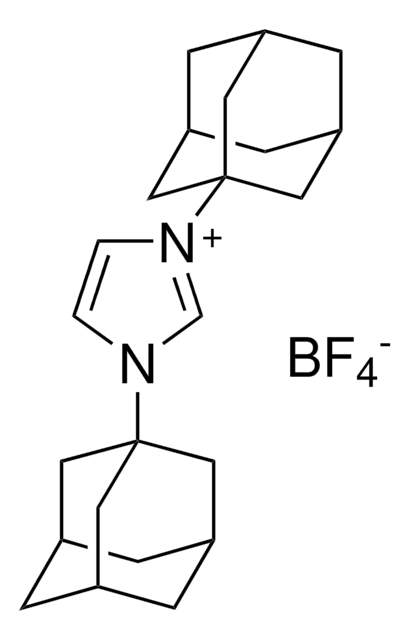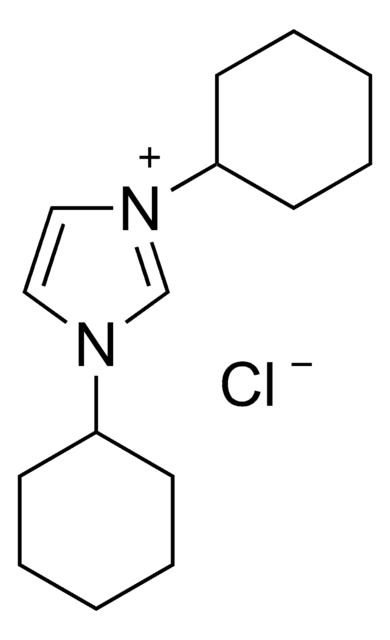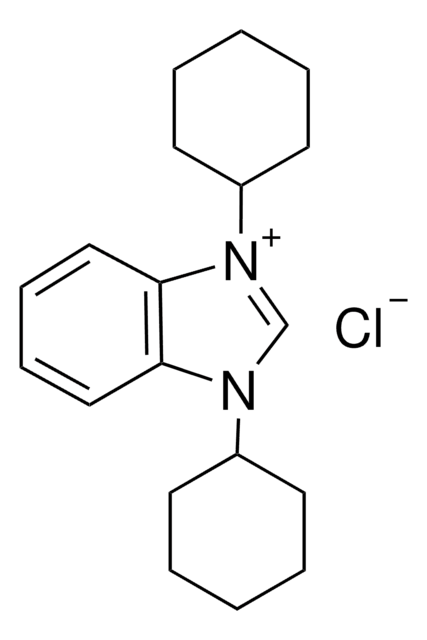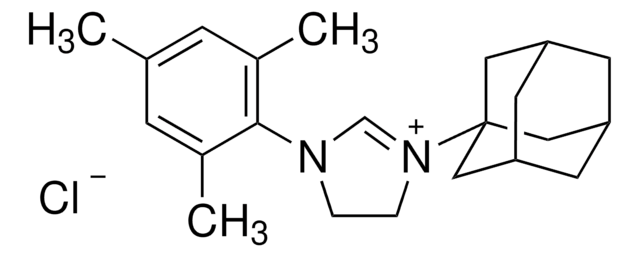656631
1,3-Bis(2,4,6-trimethylphenyl)imidazolinium chloride
95%
Sinónimos:
1,3-Dimesitylimidazolidinium chloride, 4,5-Dihydro-1,3-bis(2,4,6-trimethylphenyl)-1H-imidazolium chloride, 4,5-Dihydro-1,3-dimesityl-1H-imidazolium chloride, N,N′-(2,4,6-Trimethylphenyl)dihydroimidazolium chloride
About This Item
Productos recomendados
Quality Level
assay
95%
reaction suitability
reagent type: ligand
mp
280-286 °C
SMILES string
[Cl-].Cc1cc(C)c(N2CC[N+](=C2)c3c(C)cc(C)cc3C)c(C)c1
InChI
1S/C21H27N2.ClH/c1-14-9-16(3)20(17(4)10-14)22-7-8-23(13-22)21-18(5)11-15(2)12-19(21)6;/h9-13H,7-8H2,1-6H3;1H/q+1;/p-1
InChI key
COGMCBFILULEOS-UHFFFAOYSA-M
Categorías relacionadas
General description
Application
Precursor to an N-heterocyclic carbene catalysts used for:
- A regioselective cycloadditon of terminal acetylenes with azides leading to 1,4-disubstitutedtriazoles. Internal acetylenes can also be used with this catalyst.
- Markovnikov-type hydration of terminal alkynes
- Hydrosilylation of ketones and cycloaddition of azides and alkynes
- Suzuki-Miyaura reactions
- Luminescence experiments
signalword
Warning
hcodes
Hazard Classifications
Eye Irrit. 2 - Skin Irrit. 2 - STOT SE 3
target_organs
Respiratory system
Storage Class
10 - Combustible liquids
wgk_germany
WGK 3
flash_point_f
Not applicable
flash_point_c
Not applicable
ppe
Eyeshields, Gloves, type ABEK (EN14387) respirator filter
Certificados de análisis (COA)
Busque Certificados de análisis (COA) introduciendo el número de lote del producto. Los números de lote se encuentran en la etiqueta del producto después de las palabras «Lot» o «Batch»
¿Ya tiene este producto?
Encuentre la documentación para los productos que ha comprado recientemente en la Biblioteca de documentos.
Los clientes también vieron
Artículos
Metal complex-catalyzed cross-coupling reactions of unactivated substrates introduce diverse phosphine ligands in chemical marketplace.
Emerging class of privileged ligands
A wide range of NHC ligands are commonly available which exhibit high activities.
The Hazari group has developed an improved palladium precatalyst scaffold for a wide range of cross-coupling reactions
Nuestro equipo de científicos tiene experiencia en todas las áreas de investigación: Ciencias de la vida, Ciencia de los materiales, Síntesis química, Cromatografía, Analítica y muchas otras.
Póngase en contacto con el Servicio técnico
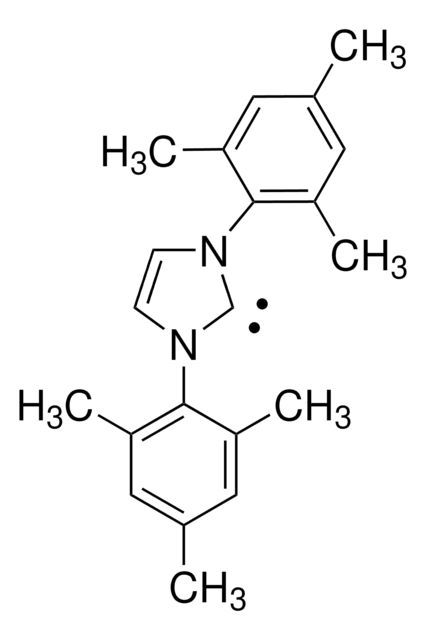
![Chloro[1,3-Bis(2,4,6-trimethylphenyl)imidazol-2-ylidene]copper(I) 95%](/deepweb/assets/sigmaaldrich/product/structures/160/888/97509eeb-0719-4853-aaae-8a9d02f4f7ad/640/97509eeb-0719-4853-aaae-8a9d02f4f7ad.png)
![[1,3-Bis(2,6-diisopropylphenyl)-imidazol-2-ylidene]copper(I) chloride](/deepweb/assets/sigmaaldrich/product/structures/199/763/44637b2e-b87c-42a3-abc3-3985b6cd7d5d/640/44637b2e-b87c-42a3-abc3-3985b6cd7d5d.png)


